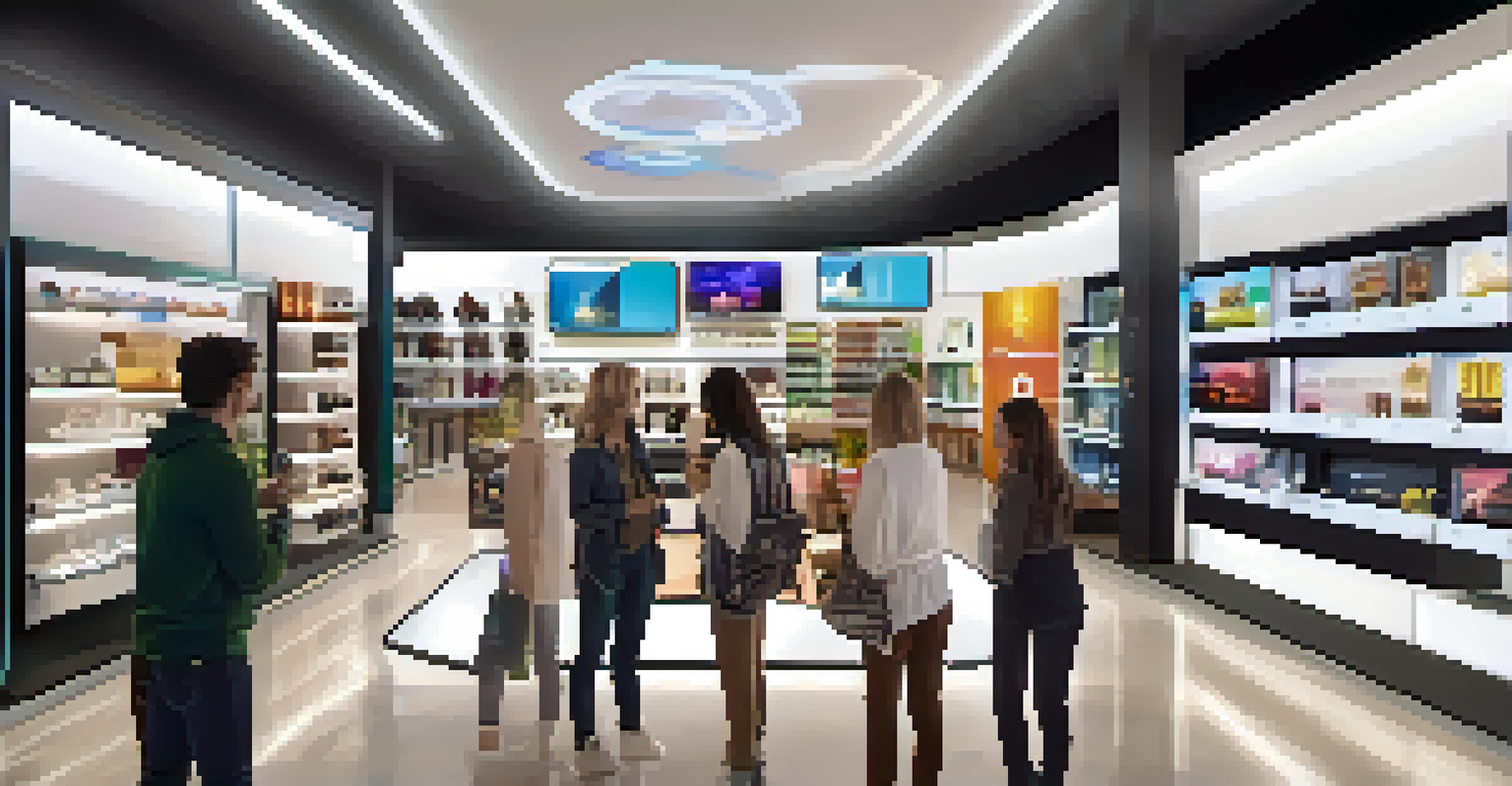Career Paths in Augmented Reality: Skills and Training

Understanding Augmented Reality: A Brief Overview
Augmented reality (AR) blends the digital world with our physical environment, creating immersive experiences. Think of how Pokémon GO brought characters to life in real parks and streets; that's AR at work! As technology advances, industries are rapidly adopting AR for various applications, from gaming to healthcare, making it a hot career field.
Augmented reality is changing the way we interact with the world, blending the digital and physical in a unique way.
At its core, AR enhances our perception of reality by overlaying digital information onto the real world. This technology is not just limited to headsets or mobile apps; it’s also being integrated into retail, education, and training. With such versatility, understanding the fundamentals of AR is crucial for anyone considering a career in this space.
As AR continues to evolve, it presents numerous career opportunities. Whether you’re interested in design, development, or project management, grasping the basics of AR will set a solid foundation for your journey ahead.
Key Skills for a Career in Augmented Reality
To thrive in the AR industry, a blend of technical and soft skills is essential. Technical skills may include 3D modeling, coding, and user experience (UX) design. For example, knowing how to use software like Unity or Unreal Engine can significantly boost your employability, as these are commonly used for AR development.

On the softer side, communication and problem-solving skills are invaluable. AR projects often require collaboration across diverse teams, so being able to articulate ideas clearly and work well with others is key. Think of it like being part of a sports team; each player has a role, but teamwork is what leads to victory.
AR Careers Require Diverse Skills
A successful career in augmented reality combines technical skills like coding and 3D modeling with soft skills such as communication and problem-solving.
Lastly, a passion for technology and a willingness to learn will keep you ahead in this fast-paced field. Given the rapid advancements in AR technology, staying updated with new tools and trends can set you apart from the competition.
Educational Background for AR Professionals
While there isn't a specific degree required for all AR roles, many professionals come from backgrounds in computer science, graphic design, or engineering. These fields provide a solid grounding in the principles necessary for understanding AR technologies. For instance, a degree in computer science can equip you with essential programming skills needed for AR development.
The future of augmented reality is not just about technology; it's about how we can enhance our everyday experiences.
However, formal education isn’t the only route. Many successful AR professionals are self-taught or have completed online courses focused on AR and VR technologies. Platforms like Coursera or Udacity offer specialized courses that can help you learn at your own pace, fitting study around your current commitments.
Additionally, pursuing internships or projects related to AR can provide practical experience that is just as valuable as classroom learning. Getting hands-on experience helps you build a portfolio that showcases your skills to potential employers.
Certifications: Boosting Your AR Career Prospects
Certifications can significantly enhance your resume and demonstrate your expertise in specific areas of AR. Programs offered by organizations like the International Association of Augmented Reality (IAAR) can help validate your skills. These certifications often cover essential topics such as AR development, user interface design, and technical project management.
Moreover, online platforms like LinkedIn Learning or Coursera provide various certification courses tailored to AR. Completing these can show employers that you are committed to your professional development and are knowledgeable about the latest trends and technologies in AR.
Certifications Enhance Career Prospects
Obtaining certifications in AR can validate your expertise and demonstrate your commitment to ongoing professional development.
Having a certification can also give you a competitive edge in the job market. It signals to potential employers that you not only have the skills but are also dedicated to continuous learning and improvement.
Networking: Building Connections in the AR Industry
Like many tech fields, networking is crucial in the AR industry. Attending industry conferences, workshops, and meetups can connect you with other professionals and potential employers. These events provide a platform to share ideas, learn from experts, and even find job opportunities.
Online communities, such as forums or social media groups dedicated to AR, are also valuable resources. Engaging with these communities can help you stay updated on industry trends, share your work, and receive feedback from peers. Think of it as joining a club that shares your interests—collaboration and support are key!
Lastly, don't underestimate the power of informational interviews. Reaching out to professionals in the field for a chat can provide insights into their career paths and advice on how to navigate your own journey. This approach not only broadens your understanding but can also lead to mentorship opportunities.
Job Roles in Augmented Reality: What to Expect
The AR industry offers a variety of job roles, each with its own focus and responsibilities. Common positions include AR developers, UX/UI designers, and project managers. For example, AR developers are primarily responsible for creating the actual applications using programming languages and development tools.
On the other hand, UX/UI designers focus on how users interact with AR applications, ensuring that experiences are intuitive and engaging. This role requires a blend of creativity and technical understanding, as designers need to visualize how users will navigate virtual environments.
Networking is Key in AR Industry
Building connections through industry events and online communities can open doors to job opportunities and provide valuable insights into the AR field.
Project managers, meanwhile, oversee AR projects from conception to completion, coordinating between teams and ensuring deadlines are met. This role requires strong organizational skills and the ability to manage multiple moving parts, similar to orchestrating a play where every actor needs to hit their mark at the right time.
Future Trends in Augmented Reality Careers
As technology progresses, the future of AR careers looks promising. With advancements in hardware, such as AR glasses and improved mobile devices, the demand for AR professionals is expected to grow. Industries like retail, healthcare, and education are increasingly incorporating AR into their operations, creating a wealth of opportunities.
Moreover, emerging technologies like artificial intelligence (AI) and machine learning are beginning to integrate with AR. This fusion opens up new avenues for innovation, leading to even more specialized roles. Imagine creating AR applications that adapt in real-time to user behavior; that’s the kind of future we’re looking at!

Staying ahead of these trends will be vital for anyone entering the AR field. Continuous learning and adaptability will be your best allies as the industry evolves, ensuring you remain relevant and in-demand in this exciting landscape.